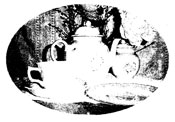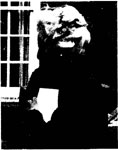Blow Out the Moon (22 page)

He just smiled: of course, he remembered.
“And this will be even better,” he said. “Now I know what they did in the real ceremonies. I even have some real arrowheads.”
“We could use them in the ceremony — before the oath!” I said. “But let’s make up our own oath.”
“I knew you’d say that.”
We laughed – it wasn’t that funny, we were just happy. We talked until he went out for recess. (Now that we were older, Henry said, we didn’t line up: people just went — or stayed in.) He turned around at the door and I looked up from sharpening my pencil at exactly the same time.
“Remember that china barrel?” I said. “You were right. Not one thing in it was broken.”
“That’s good,” Henry said; he knew what a relief that was, I could tell.

The wildflower breakfast set, not broken.
I got some paper — nice big American paper — from the pile, and decided to write about riding horses! I’d start with the Romans — they invented saddles with stirrups to use in their wars in England and other places. I could describe what it felt like to canter, too.
I looked down at the paper on my desk (bright white paper, blue lines) and then around the classroom. The tall windows that went almost up to the ceiling were the same as the ones in our old classroom, but I’d never liked how MUCH sky you could see (it was too blank). Now I did like that blank bright blue sky. It was filled with light and wide open to anything.
I felt like that, too, and bursting with energy. English or American, both or neither: I was back. I shook the hair out of my face (like a horse shaking its head before it stretches its neck!), stretched
my
neck, and started to write.
The End
I never saw any of the kids again (I knew I wouldn’t, that was partly why it was so hard to say good-bye); but later, I went back to Sibton Park and saw Marza.
Her hair was white, not gray; but other than that, she was the same. I thanked her as well as I could for what she and Sibton Park had shown me and taught me and meant to me, and she said (she was always so polite), “You make it all seem worthwhile.”

Marza as she looked the last time I saw her. I didn’t think to take a picture: the photograph is from the school newspaper.
I went into the Night Nursery, and our study, and the passage where we lined up for meals. The macs and Wellingtons looked just the same; and so did the floor, where all those feet over the years had worn down the bricks. But the walls were different: they were covered with framed photographs, including one of the whole school my first term there.
It wasn’t faded or blurry, the images were sharp and clear, the paper glossy white. Maybe it was the pose (everyone so straight), or the composition (exactly centered), or maybe just an old lens or paper or process that produced perfectly focused, fine-grained pictures, with glossy whites and gleaming blacks and grays. But obviously, the photograph was from the past, and as clearly focused as a view through a telescope.
We were in the Lower Garden, where we had stories in summer, wearing our striped summer dresses. We were in three rows: the littlest children cross-legged on the grass, the middle ones in chairs behind them, the biggest ones standing up behind them. Everyone sat, or stood, very straight, with her hands neatly folded in her lap, smiling politely — everyone except one child in the front row. That child was sprawled on the grass, chin up, staring into the camera, not exactly smiling, but not sad, either — confident, even defiant, ready for anything: “Go ahead — just try and make me do it.” She looked as if she’d be glad to fight anyone who tried to make her do anything, but was pretty sure no one would try. I thought she looked spunky and very American. That was me, when I first went to Sibton Park, before I learned to think about other people and care what they thought about me.
Temper
“Blow out the light,” they said, they said,
(She’d got to the very last page);
“Blow out the light,” they said, they said,
“It’s dreadfully wicked to read in bed!”
Her eyes grew black and her face got red
And she blew in a terrible rage.
She put out the moon, she did, she did,
So frightfully hard she blew,
She put out the moon, she did, she did …
— Rose Fyleman
To anyone who has read this book:
Most grown-ups, especially my friends’ mothers, liked me better after England, when I’d become politer; but it
was
fun to do the kinds of things my friends and I did before that happened. If you’d like to read more about them, go to my Web site, ifyoulovetoread.com. There are chapters that aren’t in this book, color versions of the pictures that are, my favorite fairy tales, and letters from readers.
If you would like to make a comment about the book or tell me something about you, please write to me:
I’ll write back — unless I become so famous that I get hundreds of letters a week. But I doubt that I’ll ever be
that
famous, even if Marza turns out to be right about my becoming a “well-known writer.”
Thank you for reading my book.
Your friend,
Libby Koponen
